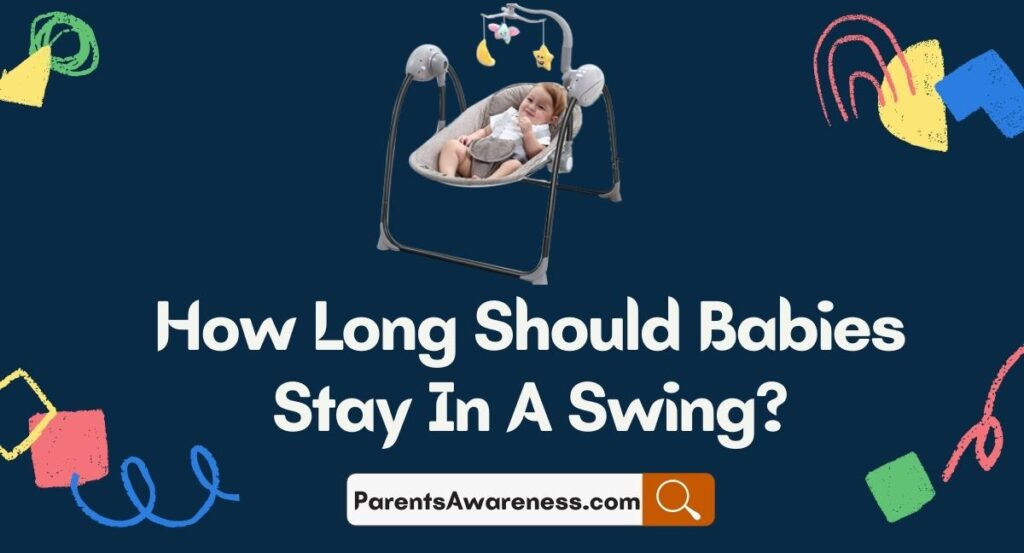How Long Should Babies Stay In A Swing?

Some People Excel At How Long Should Babies Stay In A Swing? And Some Don’t – Which One Are You?
How Long Should Babies Stay In A Swing? Baby swings are a great way to soothe your baby and occupy him while you get a few chores done. They are available in all kinds of styles and sizes. Some are even portable and swing in multiple directions.
Their rhythmic back-and-forth motion soothes your baby. While there are many benefits of baby swings, there are always questions about them. This is why I am here to answer it.
The length of time a baby sits on a swing affects more than just their safety. It also impacts the development of motor skills that eventually lead to sitting, crawling, and walking. Spending too much time on a swing doesn’t help them develop such skills. And while a surefire way of calming a fussy baby, there are other ways to quiet him down, such as swaddling or holding him.
With that being said, you must consider the following factors when deciding how much time your baby should spend on a swing.
Size and styles
The baby swings come in different designs. Some are made for newborns, while others are designed for toddlers. They also have weight limits, with some handling as much as 30 pounds. You must double-check your baby’s weight and size to ensure they match the swing you purchase. Some babies are always mobile and may try to climb out of the swing. In this case, ensure the safety harness is fastened correctly.
Freedom of movement
There is a good reason why security is essential while babies swing. The straps and harnesses keep your baby from falling out. Unfortunately, the increased safety comes at the cost of movement. Leaving your baby in the swing for an extended period also means keeping him immobile. He is incapable of stretching his legs and arms, which is crucial for developing motor skills. The motion of the swing can also prevent a toddler from moving his head.
Sleeping patterns
A lot of swinging can cause a baby to feel dizzy, which is not good for anyone. The baby loses sleep, and this, in turn, affects their sleeping patterns. It is another reason why you should limit the amount of time your baby spends on a swing. If the baby becomes dependent on the rhythmic motions of the swing to sleep, he may not be able to fall asleep on his own.
Personal interaction
Toddlers who spend too much time on a swing often miss out on interacting with their parents, both physically and emotionally. Even with the soothing rhythmic motions, the baby still can’t see their mother’s face or hear her voice.
Age
Babies under the age of four months should be kept in the most reclining position possible. This is because putting them in an upright position puts a lot of pressure on the spine, which may cause its deterioration. Leaving them in the swing for extended periods can hinder the development of motor skills.
On the other hand, babies older than four months may try to wiggle their way out of the swing. They may get into an awkward position that blocks the airway and causes suffocation. After all, they do have limited neck control. Adult supervision is a must when the baby is left on the swing. Be careful not to let him spend too much time on the swing, though.
Final verdict:
While it all comes down to personal preference, you must consider the above factors. You don’t want to limit the development of motor skills or disrupt sleeping patterns. In addition, you must take time to bond with your little one physically and emotionally.
There is also the issue of age. Younger babies should spend less time on swings to encourage the strengthening of the spine. On the other hand, older babies need room to move their hands and feet.
Some experts recommend that babies must spend less than an hour a day on the swing. In contrast, others think that you should allow thirty-minute intervals when your baby is swinging. Whatever you decide, keep in mind that too much time on the swing may cause your baby to develop habits that are difficult to break.


![Best Parenting Tips For Toddlers [2023]](https://parentsawareness.com/wp-content/uploads/2022/01/Best-Parenting-Tips-For-Toddlers-768x415.jpg)